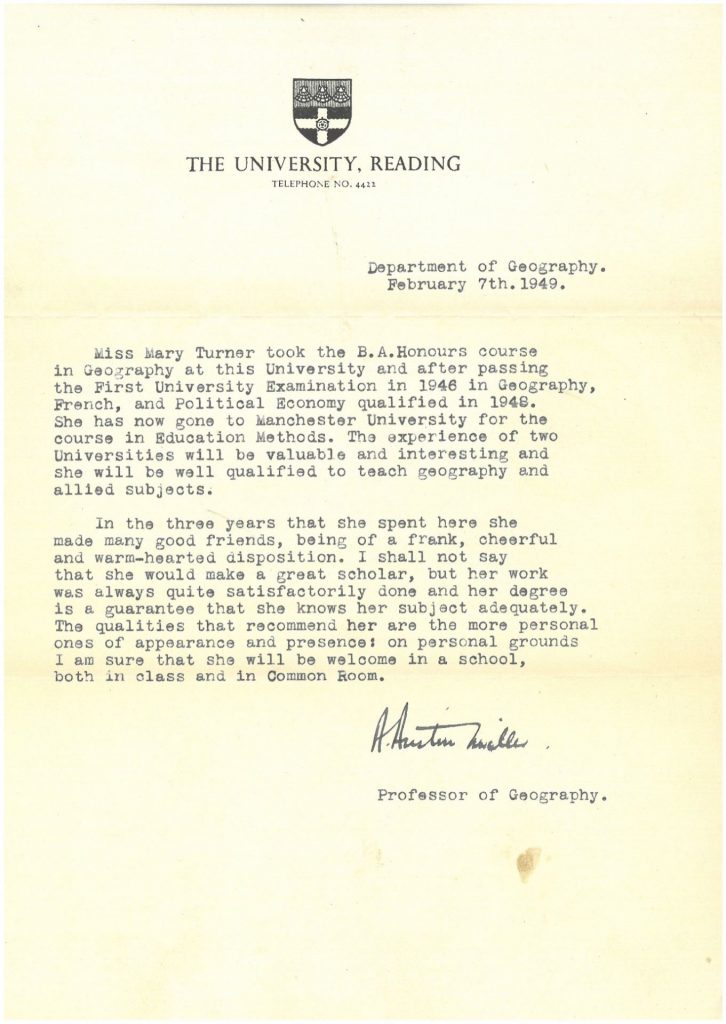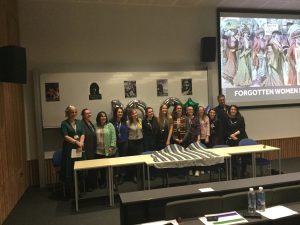During Women’s History Month we often focus on great women and women pioneers. But for Women’s History Month 2022, here at the Department of History, we are privileged to be able to concentrate on one of our own, Mary Turner Wolstenholme. Mary represents so many women who might have considered themselves ordinary but whose achievements tell us so much about women’s lives and opportunities. With the kind permission her daughters Gilly Pinner and Julie Wolstenholme and through their generous donation of their mother’s documents and photographs from her time at Reading we present: Mary Turner Wolstenholme.
Mary Turner completed a BA Hons in Geography and graduated on 1st July 1948. She graduated in the same year that the eminent historian Doris Stenton received her doctorate in History. 1948 was also an auspicious year that saw the founding of the NHS. After graduating from Reading in 1948 with a BA Hons in Geography, Mary (known as Molly) went on to complete her teacher’s diploma at Manchester Victoria University. She subsequently became a teacher at a local high school in the Rossendale Valley, Lancashire, known as Whitewell Bottom. She married Robert Wolstenholme in 1952 and her daughter Gilly was born in 1956 and Julie in 1959. Mary retuned to teaching when her own daughters started school, as a primary school teacher, first at Stubbins County Primary then Edenfield CofE Primary. She continued teaching at Edenfield, later becoming Deputy Head, until taking early retirement in the 1980s. Through the kind gift of Mary’s personal papers we can see her journey to becoming an educator herself though her time at Reading.
Rag Week 12th March 1947
Rag week is almost a lost tradition, it was a designated week when the university and the town came together; students organised fayres and a procession of floats to raise money for local charities.

Kimber, Bill Ashton, The Mayor, Brian Robinson, Roger Williams
Students attempt to kidnap Phoebe Cusden, first female mayor of Reading and eminent peace campaigner. Read more about Phoebe Cusden at the Berkshire Records Office where her papers are held The Berkshire Record Office
Final Examinations
BA Geography examinations consisted of eight 3-hour papers. How would you have done?

Other papers included: Human and Historical Geography, Geography (PRACTICAL), Physical Geography, Regional Geography (EUROPE), Regional Geography (BRITISH ISLES AND FRANCE), Economic Geography, Cartography
Graduands for presentation
When Mary graduated there were a surprising number of women gaining a Bachelor of Arts degree from the Faculty of Letters. For the Bachelor of Science degrees however the number of women dwindles hugely!

Doris Mary Stenton (Lady Stenton), was awarded her doctoral degree D. Litt. from the Faculty of Letters at the same presentation.

Graduation, July 1st, 1948 (Geography Group):
Mike Banyon, Shirley Jones, Frank Pierce
Isobel Ayers, Sheila Knight, Mary Turner, Ron Waters
Ron Stone, Margaret Lawes, Mags Johnson, Frances Pilling
Reference in application for Education Methods (modern PGCE)
What Mary made of her reference from Professor Austen Miller in 1949 we do not know but it is eye-wateringly misogynistic by C21st standards! While Mary was of a ‘frank, cheerful and warm-hearted disposition’, she might not make ‘a great scholar’. In fact
‘The qualities that recommend her are the more
personal ones of appearance and presence…’

In 1878, the University of London was the first to award degrees to women. Both Oxbridge universities were among the last to grant women degrees on the same terms as men: Oxford in 1920 but not until 1948 at Cambridge, the same year that Mary Turner graduated from Reading. The granting of degrees by Cambridge caused a huge amount of unrest with male undergraduates burning effigies of women students and throwing fireworks at the windows of women’s colleges. Even then, the university was allowed to limit the numbers of female students relative to men and continued to exercise that power to the full. The University of Reading awarded degrees to women on the same terms as men from its inception in 1926.
Mary Turner, BA Geography, 1st July 1948












 In the last three years we have set up three such groups. In each case a framework for what the groups think about and do has been provided by existing national self-assessment and action-planning schemes. These are:
In the last three years we have set up three such groups. In each case a framework for what the groups think about and do has been provided by existing national self-assessment and action-planning schemes. These are: What are pronoun badges and why are people wearing them?
What are pronoun badges and why are people wearing them? Our celebration of IWD takes the form of a series of short talks followed by a student-led debate on the issues we’ve raised and on other issues that matter to the attendees. What is so positive about this event is that it involves joining our students in conversations about equality, diversity, and social justice: it involves not only talking but, more importantly, listening to each other’s views.
Our celebration of IWD takes the form of a series of short talks followed by a student-led debate on the issues we’ve raised and on other issues that matter to the attendees. What is so positive about this event is that it involves joining our students in conversations about equality, diversity, and social justice: it involves not only talking but, more importantly, listening to each other’s views. y an exhibition and a party, ‘Celebrating Forgotten Women’.
y an exhibition and a party, ‘Celebrating Forgotten Women’. . Colleagues from English Literature and History contributed fascinating talks on a variety of ‘forgotten women’. Dr Mary Morrissey (Lit) spoke with great wit about the first known published English female poet, Isabella Whitney; Professor David Stack (History) discussed the work of palaeontologist Mary Anning; Dr Natalie Thomlinson (History) discussed Jayaben Desai; Dr Jacqui Turner (History) introduced the evening and spoke of the suffrage movement, and I discussed the neglected significance of the work of translator Constance Garnett. Part 2, Part 3, and PhD students from English Literature, History and Classics delivered confident, reflective and inspiring talks on Harriet Tubman, Cloelia, Emma Gifford, Libby Lane, and Ching Shih, and the Q&A session produced well-informe
. Colleagues from English Literature and History contributed fascinating talks on a variety of ‘forgotten women’. Dr Mary Morrissey (Lit) spoke with great wit about the first known published English female poet, Isabella Whitney; Professor David Stack (History) discussed the work of palaeontologist Mary Anning; Dr Natalie Thomlinson (History) discussed Jayaben Desai; Dr Jacqui Turner (History) introduced the evening and spoke of the suffrage movement, and I discussed the neglected significance of the work of translator Constance Garnett. Part 2, Part 3, and PhD students from English Literature, History and Classics delivered confident, reflective and inspiring talks on Harriet Tubman, Cloelia, Emma Gifford, Libby Lane, and Ching Shih, and the Q&A session produced well-informe d questions from our largely UG student audience. WSPU-Coloured lanyards and commemorative postcards were given to our guests, a badge-making operation in the exhibition space produced highly professional badges of our ‘forgotten women’, and an exhibition managed by Guy Baxter from Special Collections displayed the Cliveden House visitor’s book and a Suffragette ring amongst other exhibits. WSPU-coloured balloons festooned the Edith Morley First Floor Foyer, Blackwells ran a book-stall, and the wine flowed. The event ran for three hours in and outside the Van Emden Lecture Theatre.
d questions from our largely UG student audience. WSPU-Coloured lanyards and commemorative postcards were given to our guests, a badge-making operation in the exhibition space produced highly professional badges of our ‘forgotten women’, and an exhibition managed by Guy Baxter from Special Collections displayed the Cliveden House visitor’s book and a Suffragette ring amongst other exhibits. WSPU-coloured balloons festooned the Edith Morley First Floor Foyer, Blackwells ran a book-stall, and the wine flowed. The event ran for three hours in and outside the Van Emden Lecture Theatre. staff and students of English Literature, Classics and History, all of whom are working together to revive feminist debates on campus. ‘Celebrating Forgotten Women’ showcased the benefits to learning of work placements, and demonstrated the strength of the staff-student partnerships and inter-School collaborations at Reading. Above all, it has showcased that of which we are most proud at Reading – our students.
staff and students of English Literature, Classics and History, all of whom are working together to revive feminist debates on campus. ‘Celebrating Forgotten Women’ showcased the benefits to learning of work placements, and demonstrated the strength of the staff-student partnerships and inter-School collaborations at Reading. Above all, it has showcased that of which we are most proud at Reading – our students. lly renewed its Athena SWAN silver award in 2017. We have made significant progress in gender parity in many areas of staff and student recruitment, inclusive work environment, and career progression. However, our recent data analysis and focus groups did also bring to light some previously unexamined issues, such as an intersectional gender-ethnicity attainment gap as well as concerns of gender differences in numbers going on to postgraduate studies. In response, among other actions in the SMPCS Athena SWAN Action Plan 2017, we have included an action to explore how we can raise attainment and career aspirations through the development of a web resource highlighting diverse role models within subjects studied by SMPCS students. This is especially relevant here as the staff currently delivering our undergraduate and postgraduate programmes are somewhat less diverse than our students (we are also working towards rectifying this within our action plan).
lly renewed its Athena SWAN silver award in 2017. We have made significant progress in gender parity in many areas of staff and student recruitment, inclusive work environment, and career progression. However, our recent data analysis and focus groups did also bring to light some previously unexamined issues, such as an intersectional gender-ethnicity attainment gap as well as concerns of gender differences in numbers going on to postgraduate studies. In response, among other actions in the SMPCS Athena SWAN Action Plan 2017, we have included an action to explore how we can raise attainment and career aspirations through the development of a web resource highlighting diverse role models within subjects studied by SMPCS students. This is especially relevant here as the staff currently delivering our undergraduate and postgraduate programmes are somewhat less diverse than our students (we are also working towards rectifying this within our action plan).